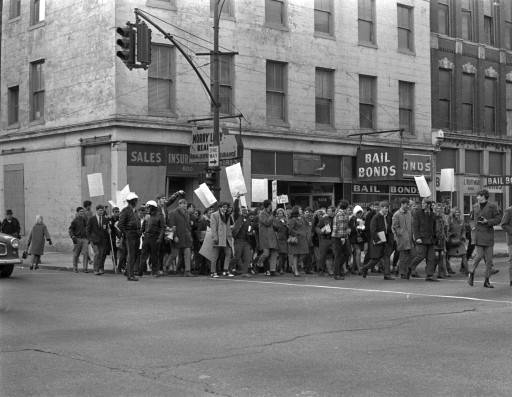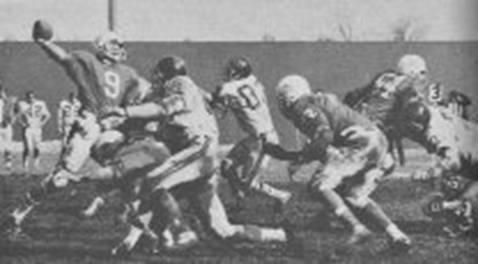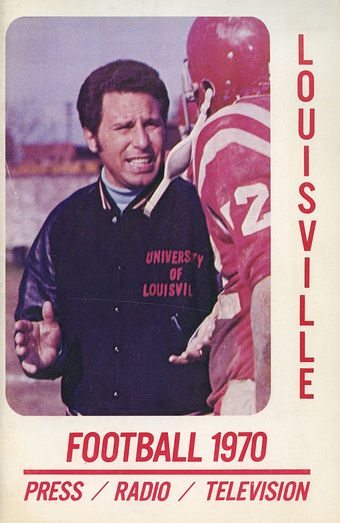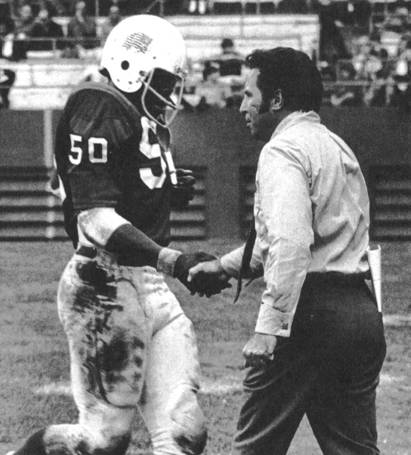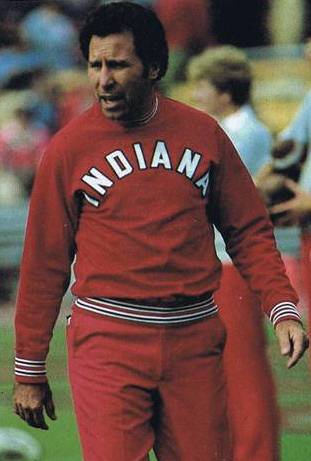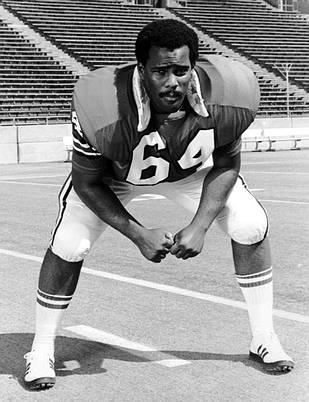

A LOOK AT LEE CORSO, THAT'S "COACH CORSO," AT LOUISVILLE
HELMET HUT NEWS/REFLECTIONS September 2014:
A LOOK AT LEE CORSO, THAT'S "COACH CORSO," AT LOUISVILLE
By Dr. Ken
One of my favorite football personalities is Lee Corso. Many HELMET HUT readers, while certainly familiar with Corso as a college football analyst and integral part of the ESPN College Game Day programming, were first made aware that Lee Corso was an outstanding collegiate football player after they read the seasonal summaries of our Florida State helmet display [ see HELMET HUT http://www.helmethut.com/College/FloridaState/FSindex.html ]. Our staff had as much fun as the international audience watching Corso don his 1955 Florida State uniform which included the authentic reproduction of his helmet that was provided to him and ESPN by HELMET HUT [ see http://helmethut.com/College/FloridaState/Corso.html ] on Game Day.
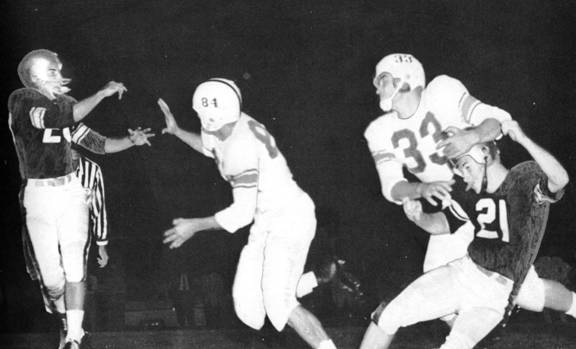 |
Lee Corso stood out as a quarterback and on defense
The helmet of course was beautiful and reminded fans “in the know” that Corso had overcome a modest socioeconomic background to star as a multi-sport athlete at Miami’s Andrew Jackson High School and then as the quarterback and school interception record setting defensive back of Florida State. What was also new information to many was the fact that Lee was an innovative college football coach, both as an offensive assistant and head coach, one who was influential in opening up the passing game wherever he applied his skills. He was popular with his players and fans and if nothing else, brought tremendous enthusiasm to the profession. The “wild and crazy” nature that he often if not always demonstrates on the College Game Day set is nothing new and not a television construct. Corso’s motto, admittedly borrowed from Ralph Waldo Emerson, is “Nothing was ever achieved without enthusiasm” and he applied it immediately as a coach. He was an ace recruiter as well as something of an offensive genius.
After serving his time as an
assistant at Maryland and the
U.S. Naval Academy, he became
the head coach at the University
of Louisville in 1969. Though
the news did not spread far from
the Louisville area, naming
Corso as the Cardinals head
coach produced major local
demonstrations. Protestors
filled the city streets, calling
upon the U of L administration
to hire Paulie Miller, one of
the most highly respected high
school coaches in the state.
Miller attained his status as
the head football coach of
Louisville’s Bishop Flaget High
School, establishing the program
as their inaugural coach in
1945, winning state
championships in 1949, 1952,
’58, and 1961, and developing
highly successful players, with
Paul Hornung and Howard
Schnellenberger perhaps the best
known. He coached at Flaget
through 1963 and was clearly the
people’s choice and on February
19, 1969, his supporters took to
the streets, loudly protesting
the hiring of anyone but Miller.
Paulie Miller’s supporters
filled the streets of
Louisville, demanding that
he be named the Cardinals
new head coach
Corso was a thirty-three year
old unknown while Miller was a
local legend. The pressure was
on Corso immediately, even at
Louisville where the program was
typically “middle of the road”
with the addition of a few nine
win seasons and a few one or two
win seasons under head coach
Frank Camp who had held the
reins from 1946 through ’68.
While there had been an
occasional star, like the
Chicago Bears linebacker Doug
Buffone, there was never a lot
to cheer about or make the
stadium a definitive destination
on a Fall Saturday afternoon.
There was pressure too from the
school administration with some
believing that a lack of revenue
and poor attendance could soon
lead to the program either
cutting back to “small college”
level, or being dropped
completely. The message was
clear, “Win and fill the seats!
Do it now.”
If nothing else, Corso was
immediately fun and as Sports
Illustrated noted during the
1970 season, Lee “was coaching
at Louisville and making a name
for himself by 1) coaching good
and 2) having fun, a
contradiction in terms by most
accepted coaching tenets.” He
did a lot of fourth down
gambling, literally waved the
white towel from the sideline
against Memphis State in a 69 –
19 blowout loss, marched a
turkey onto the field for the
pre-game coin toss and captain’s
meeting for a Thanksgiving day
clash against Tulsa, and rode an
elephant through the streets of
the city. He recruited well,
bringing in Tom Jackson from
John Adams High School in
Cleveland and quarterback John
Madeya who would throw for more
than 4500 yards before he
graduated.
Louisville QB John Madeya
became a record setter under
Coach Corso
Corso’s 5-4-1 mark in ’69 jumped
to 8-3-1 the following season
and it was obvious that his team
liked their head coach and was
playing hard for him and the
staff. He hosted “Italian
Nights” at the training table,
complete with checkered
tablecloths, candles, and a menu
that included pasta, garlic
bread, and spumoni. They enjoyed
their “hip” and modernized
pre-game warm up routines, eye
catching enough to have the
Georgia Tech staff ask for
advice. Of course, Corso quipped
that he would have been happier
if Tech had been interested in
asking for his football plays.
He solicited walk-ons and was
rewarded with Scott Marcus, a
bearded, long-haired hippie type
who was given a full scholarship
for his exceptional punting
ability.
Behind the antics was a lot of
very good coaching. Corso’s eye
for talent where others did not
see it held him in good stead.
Tom Jackson was listed as 5’11”
and 220 pounds but according to
Corso, was closer to 5’8”,
perhaps a bit of an
exaggeration. Still, Jackson was
not highly sought by other
collegiate programs because he
was considered to be “too
small,” but Corso saw a hitting
machine, a player that “had
fantastic quickness” and
strength and most importantly,
“He just never missed. He never
missed a guy. Those guys at Ohio
State, Gradishar, Cousineau, and
some of those others at
Michigan, they were good, but
this guy (Jackson) was better
than any of them.” At
Louisville, Jackson was a
three-time All Missouri
Conference selection, two-time
MVC Player Of The Year, and led
the team in tackles in each of
his three varsity seasons,
eventually having his number
retired. He went on to a highly
successful fourteen year career
with the Denver Broncos, winning
All Pro honors four times and
later became a popular ESPN
football analyst and
commentator.
Coach Corso greets star
linebacker Tom Jackson as he
leaves the field. The Cardinals
wore an American flag decal
during a period of time when
flying the flag was not popular
on many college campuses
Although riding an elephant and
bringing a turkey onto the field
for the coin toss can be seen as
gimmicks designed to attract
attention and fans, Corso’s
coaching knowledge, teaching
ability, and dedication to old
fashioned values and the
fundamentals of the game were
real. He affixed American flag
decals to both sides of the
white helmet during a time of
social strife, anti-war
protests, and anti-government
sentiment. While often burning
the country’s flag on campus was
viewed as an acceptable form of
protected speech and anything
staunchly supporting “The
Establishment” was viewed as
“square,” and unacceptable by
college aged students, Corso had
his team display the flag as
part of the uniform “to
symbolize what I have been
trying to teach the kids:
teamwork, unity, pride,
dedication, and respect.”
Whatever values Corso taught,
they were accepted by his squad.
The 1969 team posted a 5-4-1
record with improvement to
8-3-1, the Missouri Valley
Conference Championship in ’70
and a 24-24 tie with Long Beach
State in the Pasadena Bowl. 1971
produced a solid 6-3-1 result
and in Corso’s final season in
’72, they rolled to a 9-1
performance, losing only to
Tulsa by a margin of 28-26.
The hard work that Corso put
into the Cardinals program paid
off not only on the field, but
in the stands. From the day he
arrived in Louisville, he
accepted speaking engagements
anywhere and everywhere within
the borders of the Bluegrass
State. He was an exceptionally
entertaining and informative
speaker, much as he is on
television and he gave everyone
in attendance his all. He
humorously described one early
morning, pre-7 AM talk to a
booster group that drew a total
of four individuals, and when
asked he responded, “Not four
hundred, four. One, two, three,
four. Gave ‘em a hell of a
speech too. The whole load.”
This was typical Corso,
enthused, pumped up, ready to go
at 110 miles per hour and from
1969 through 1972, doing it for
the Louisville football program.
At that point his record as a
head coach was 28-11-3 and he
finished ’72 with a national
ranking of eighteen, and as is
said in the music industry when
a song is rocketing for the top,
“with a bullet.” No one doubted
that there were bright days
ahead for Louisville football
and what had been a program
under consideration for
termination saw attendance
literally quadruple while Corso
was in charge, and now had plans
for a new football stadium. Not
surprisingly, Lee Corso
attracted the attention of
other, larger programs and he
became the head coach at the
University of Indiana following
the ’72 season, a post he would
hold through 1982 before going
on to the USFL, Northern
Illinois, and ultimately
becoming a college football icon
on ESPN.
Lee Corso From a Personal
Perspective:
As a high school football
coach, I prided myself on
going the “extra mile” when
attempting to place young
men into an appropriate
college program. I was
blessed with an arrangement
where Co-Coach Joe Tuths, a
former Columbia University
center [ see
HELMET HUT NEWS
of August 2007
http://www.helmethut.com/Features/Dr.Ken46.html
]
and fellow Atlantic Coast
Football League Westchester
Bulls teammate, and I worked
hand in hand at Malverne
High School. Joe was a much
better Xs and Os coach than
I was and we both had very
good rapport with the boys
we coached. I was the point
man with college recruiters
and worked hard to make as
many meaningful contacts as
possible. At the time I
contacted Coach Corso, I was
no longer a full time
teacher or coach but jumped
in to assist one of the
players Joe and I liked so
much.
William “Bill” Jones was a 6’4”,
255 pound two-way tackle that
also threw the shotput and ran
high hurdles for our small
school. It was not unusual for
any of our athletes to
participate in two or more
sports but it was unusual to
have a young man who could
compete successfully in the
hurdles at Bill’s size. Despite
severe vision limitations, he
was an excellent student and
football player although as Alex
Karras once described playing
with his visual impairment, Bill
also had to “play body Braille
when tackling anyone.” We could
not afford the proper corrective
glasses or goggles leaving Bill
to play high school football as
he said, “almost blind.” This
did not prevent Bill’s final
college choices to come down to
Iowa and Duke. Heeding our
admonition to always get the
best college education possible,
especially with Joe as an Ivy
League graduate, Bill chose
Duke, politely thanking Iowa and
the other twenty or so schools
that had made scholarship offers
or overtures to him. A few
weeks after the colleges had
fielded their officially
accepted offers and freshman
rosters were completed, Bill
visited the Duke campus and
called my home, telling me how
well his visit was going, how
unlike his first group
recruiting visit, he now had
time to talk individually with
faculty from the department of
his projected major, and how
nice the staff was.
Unfortunately, I received
another phone call from Bill at
approximately 2 AM Sunday
morning, explaining that he
would not attend Duke because he
had gone to dinner with one of
the assistant coaches and while
waiting for a table in a “nice”
restaurant, he was taunted and
ultimately engaged in a
fistfight, along with the Duke
assistant, because a group of
men continued to direct racial
epithets towards him. A knife
was pulled, Bill and the Duke
coach fought successfully in
their own defense and thankfully
he was uninjured but the real
damage had been done. Even
though the Duke coach literally
fought hard to defend Bill , and
despite my explanation that he
should not judge a university
that would provide an absolutely
wonderful education and football
experience by the actions of a
few moronic racists, he told me
he would not ever return to “the
South.”
At 6 AM that morning, a Sunday
morning, I called the Indiana
football office. In the days
before answering machines, I was
not certain what to expect but
hoped to have a custodian answer
the phone so I could leave a
message for Coach Corso. I am
sure that my shock and surprise
were palpable as Coach Corso
himself answered the phone. His
energy was obvious as he
explained that he was doing work
before going to church and would
be back in his office later in
the day. I explained Bill’s
situation, that I was quite sure
that the Iowa scholarship had
been given to another player,
and that he was a deserving
youngster. Coach Corso said that
he had but one scholarship
remaining only because another
player had to give up football
due to medical reasons. Having
never met me, without knowing me
as an individual or a coach, and
without checking references, he
said, and I can recall this as
if the conversation occurred
yesterday, “I’ll have a ticket
waiting for him at JFK Airport
on the first flight out here
tomorrow. Put him on the plane
with a few cans of film under
his arm, we’ll evaluate him
while we give him a tour of the
campus, and see if we agree with
your assessment.” Wow, what a
break for this student-athlete
who otherwise would not be able
to attend college. In the
mid-afternoon I received a phone
call from Coach Corso, who said,
“Hey Coach, thank you, thank
you, thank you. We’re going to
get him the proper eye glasses
so he can see what he’s hitting
on the field, although he did a
great job without the glasses,
we’re going to give him some
speech remediation, we hooked
him up with two professors in
the area he wants to study, and
we want him.” I asked, “Just
like that?” Corso’s response was
“Yeah, why not? He can play
exactly as you said he could, he
is just a great kid, his
transcript is wonderful, his
test scores are high,
absolutely, he’s our kind of
kid.”
Bill played for Indiana,
graduated, and settled in the
state while establishing his own
business. I have in the decades
since, dealt with literally
hundreds if not thousands of
coaches through my own work and
because I have two sons coaching
in the NFL and to this day, Lee
Corso’s kindness and absolutely
straight forward manner has
remained one of my best
memories.
